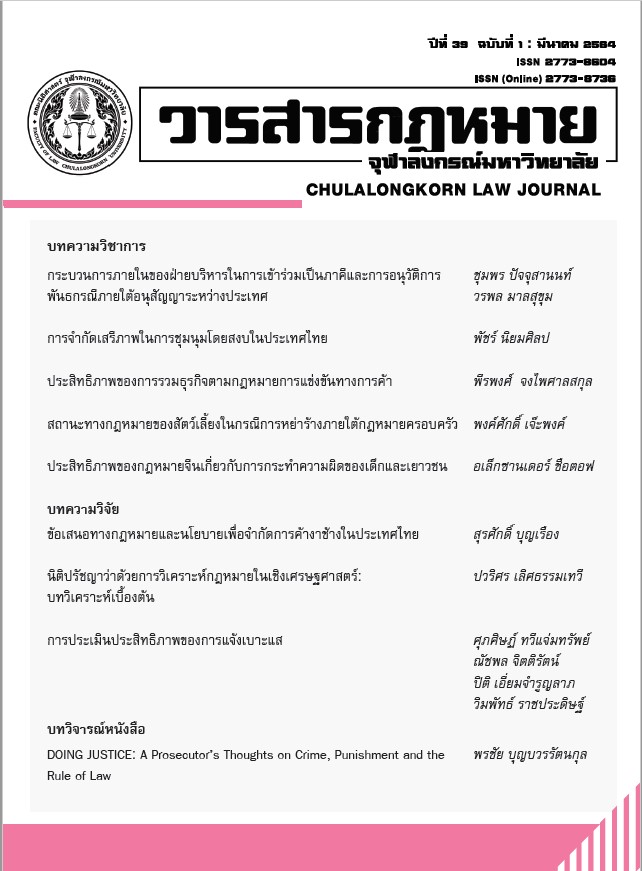ข้อเสนอทางกฎหมายและนโยบายเพื่อจำกัดการค้างาช้างในประเทศไทย
Main Article Content
บทคัดย่อ
บทความนี้มุ่งสรุปข้อค้นพบที่ได้จากรายงานการศึกษาวิจัยเรื่อง “ข้อเสนอทางกฎหมายและนโยบายเพื่อจำกัดการค้างาช้างในประเทศไทย” (รายงานการศึกษา) ซึ่งนำเสนอต่อองค์การกองทุนสัตว์ป่าโลกสากล (World Wide Fund for Nature: WWF Thailand) เพื่อนำข้อเสนอแนะไปใช้เป็นข้อมูลสนับสนุนการผลักดันให้มีการเปลี่ยนแปลงกฎหมายและนโยบายควบคุมการค้างาช้างในประเทศไทย บทความนี้มุ่งนำเสนอและวิเคราะห์ความเป็นไปได้ในการดำเนินนโยบายจำกัดการค้างาช้างในประเทศไทยโดยห้ามการค้างาช้างที่นำไปสู่การนำงาช้างออกนอกประเทศ (นโยบายห้ามการค้างาช้าง) ภายใต้กฎหมายที่มีอยู่ในปัจจุบัน โดยกำหนดกรอบการศึกษาวิเคราะห์กฎหมายหลัก 2 ฉบับ ได้แก่ พระราชบัญญัติสงวนและคุ้มครองสัตว์ป่า พ.ศ. 2562 และพระราชบัญญัติงาช้าง พ.ศ. 2558 เพื่อหาข้อสรุปและข้อเสนอทางกฎหมายเพื่อรองรับนโยบายข้างต้นโดยกำหนดกรอบเวลาดำเนินนโยบายนี้ภายในปี พ.ศ. 2565 (ค.ศ. 2022)
รายงานการศึกษาพบว่ากฎหมายที่มีอยู่ในปัจจุบันยังไม่สามารถใช้เพื่อดำเนินนโยบายห้ามการค้างาช้างได้อย่างเด็ดขาด เนื่องจากยังคงอนุญาตให้มีการค้างาช้างภายในประเทศและการส่งออกงาช้างได้ ในขณะเดียวกันมาตรการควบคุมการค้างาช้างในกฎหมายสองฉบับยังคงมีปัญหาความแตกต่างและความลักลั่นของหลักเกณฑ์การควบคุมงาช้างป่าและงาช้างบ้าน โดยกฎหมายที่ควบคุมงาช้างป่ามีช่องโหว่ทางกฎหมายในหลายประเด็น ในขณะที่บทบัญญัติควบคุมงาช้างเลี้ยงมีมาตรการเข้มงวดกว่าการควบคุมงาช้างป่าในหลายจุด นอกจากนี้ รายงานการศึกษาได้ค้นพบอุปสรรคในการดำเนินนโยบายเนื่องจากมาตรการควบคุมงาช้างหลายเรื่องยังขาดหลักเกณฑ์ในกฎหมายลำดับรองที่แน่ชัด โดยเฉพาะกฎหมายลำดับรองของพระราชบัญญัติสงวนและคุ้มครองสัตว์ป่า พ.ศ. 2562 ซึ่งอยู่ในระหว่างการร่างและจัดรับฟังความคิดเห็น จึงจำเป็นต้องมีการพัฒนาข้อเสนอทางกฎหมายและนโยบายเพื่อให้สามารถดำเนินนโยบายดังกล่าวได้
Article Details
ลิขสิทธิ์และเนื้อหาในเว็บไซต์ของวารสารกฎหมาย (รวมถึง โดยไม่จำกัดเฉพาะ เนื้อหา รหัสคอมพิวเตอร์ งานศิลป์ ภาพถ่าย รูปภาพ ดนตรีกรรม โสตทัศนวัสดุ) เป็นกรรมสิทธิ์ของวารสารกฎหมาย และผู้ได้รับการโอนสิทธิทุกราย
1. วารสารกฎหมาย ให้อนุญาตให้คุณใช้สิทธิอันไม่เฉพาะเจาะจงที่สามารถถูกถอนเมื่อใดก็ได้ โดยไม่มีค่าใช้จ่าย ในการ
- เยี่ยมชมเว็บไซต์และเอกสารในเว็บไซต์นี้ จากคอมพิวเตอร์หรือเครื่องมือสื่อสารผ่านเว็บบราวเซอร์
- คัดลอกและจัดเก็บเว็บไซต์และเอกสารในเว็บไซต์นี้บนลงคอมพิวเตอร์ของคุณผ่านระบบความจำ cache
- สั่งพิมพ์เอกสารจากเว็บไซต์นี้สำหรับการใช้ส่วนตัวของคุณ
- ผลงานที่ได้รับการตีพิมพ์โดยวารสารกฎหมาย จุฬาลงกรณ์มหาวิทยาลัย ถูกคุ้มครองภายใต้ Creative Commons Attribution 4.0 International License ซึ่งอนุญาตให้ทุกคนสามารถคัดลอก แจกจ่าย ดัดแปลง ส่งต่อ ผลงานได้ ก็ต่อเมื่อผลงานและแหล่งข้อมูลได้รับการอ้างอิงอย่างเหมาะสม
2. วารสารกฎหมาย จุฬาลงกรณ์มหาวิทยาลัย สงวนสิทธิ์ไม่อนุญาตให้คุณใช้สิทธิอื่นใดที่เกี่ยวข้องกับเว็บไซต์และเอกสารบนเว็บไซต์นี้ เช่น การคัดลอก ดัดแปลง เปลี่ยนแปลง ส่งต่อ ตีพิมพ์ แจกจ่าย เผยแพร่ จัดแสดงในที่สาธารณะ ไม่ว่าจะในรูปแบบใดก็ตาม ซึ่งเว็บไซต์หรือเอกสารบนเว็บไซต์ โดยไม่อ้างอิงถึงแหล่งข้อมูลหรือโดยไม่ได้รับอนุญาตเป็นลายลักษณ์อักษรจากวารสารกฎหมาย จุฬาลงกรณ์มหาวิทยาลัย
3. คุณอาจขออนุญาตที่จะใช้เอกสารอันมีลิขสิทธิ์บนเว็บไซต์นี้โดยการเขียนอีเมลล์มายัง journal@law.chula.ac.th
4. วารสารกฎหมาย จุฬาลงกรณ์มหาวิทยาลัย เข้มงวดกับการคุ้มครองลิขสิทธิ์อย่างมาก หากวารสารกฎหมาย จุฬาลงกรณ์มหาวิทยาลัยพบว่าคุณได้ใช้เอกสารอันมีลิขสิทธิ์บนเว็บไซต์นี้โดยไม่ถูกต้องตามการอนุญาตให้ใช้สิทธิ ดังที่กล่าวไปข้างต้น วารสารกฎหมาย จุฬาลงกรณ์มหาวิทยาลัยอาจดำเนินคดีตามกฎหมายต่อคุณได้ เพื่อเรียกร้องค่าเสียหายที่เป็นตัวเงินและคำขอชั่วคราวให้คุณหยุดการใช้เอกสารดังกล่าว ทั้งนี้ คุณอาจถูกสั่งให้ชดใช้ค่าใช้จ่ายใดๆ ที่เกี่ยวข้องกับการดำเนินการตามกฎหมายนี้
หากคุณพบเห็นการใช้เอกสารอันมีลิขสิทธิ์ของวารสารกฎหมาย จุฬาลงกรณ์มหาวิทยาลัย ที่ขัดหรืออาจขัดต่อการอนุญาตให้ใช้สิทธิดังที่ได้กล่าวไปข้างต้น โดยเชื่อว่าได้ละเมิดลิขสิทธิ์ของคุณหรือของผู้อื่น สามารถร้องเรียนมาได้ที่ journal@law.chula.ac.th


